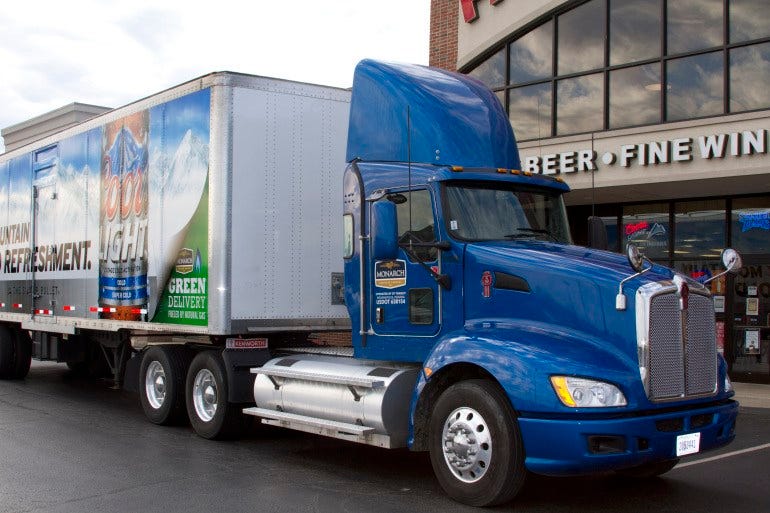CNG, LNG Growth Boosting Some Bottom Lines
 More than half of Monarch's fleet has converted to CNG.
More than half of Monarch's fleet has converted to CNG.
Subscriber Benefit
As a subscriber you can listen to articles at work, in the car, or while you work out. Subscribe NowAs natural gas gains traction in the marketplace, two Indianapolis-based companies are reaping the benefits. Monarch Beverage Co. is growing its fleet of natural gas delivery vehicles even faster than expected, and natural gas manufacturer Kinetrex says it’s seeing “unbelievable growth.”
Monarch Beverage first began converting its fleet of delivery trucks to compressed natural gas (CNG) in 2011. By 2013, about 25 percent of its fleet had been converted; today, that number has grown to 66 percent. The company remained conservative about the number of vehicles it would be able to convert, because its 119 trucks relied on a single CNG filling station on its Indianapolis property.
“We’ve now converted our Evansville fleet to natural gas, because Vectren now has a good facility in Evansville,” says Monarch Beverage Chief Executive Officer Phil Terry. “In Sellersburg [near Louisville], where we store vehicles, there’s competitive natural gas available there. Stuff we run to the far north, we’re fueling at Fair Oaks Farms around Rensselaer. There’s commercially available facilities in other locations—remote locations—that are making it more feasible for us to add more vehicles.”
Greater Indiana Clean Cities Coalition Executive Director Kellie Walsh says, just two years ago, there were only seven CNG public access stations in the entire state; that has increased to 21.
No longer relying on a single Indianapolis fueling station, Terry expects more than 90 percent of Monarch’s fleet will convert to natural gas. While a CNG truck costs about $60,000 more than a diesel truck, Terry says the long-term cost savings more than make up the difference. It costs less to fill a gas tank with CNG versus diesel, and because it’s sourced domestically, CNG’s price is relatively consistent.
“We’re three years out on our purchases of CNG. We know what our price three years from now is going to be, so we lock in a price for the future. From a budgeting and operations standpoint, that’s a big plus,” says Terry. “With diesel, the best we could do was one year out, so we couldn’t buy contracts more than a year out.”
While LNG is a different animal than CNG, LNG supplier Kinetrex Energy says business is booming, but it’s mostly outside the state.
“Historically, only about five percent or so of our sales have been in Indiana,” says Kinetrex President Aaron Johnson. “We’re one of the leading producers in the country; we’ve become one of the top players. I see what some of the other [LNG suppliers] publish as far as their numbers. We like to keep ours close to the vest, but we’ve seen unbelievable growth.”
Since opening for business in 2013, Johnson says sales jumped nearly 25 percent each month throughout the first year. He notes growth in the LNG market is more complex, because it supplies six diverse market segments: on-highway trucking, oil and natural gas exploration and production, industrial, marine, mining and rail.
Kinetrex says it’s working with companies involved in the LNG value chain to help them make investments in LNG “as simple and cheap as possible.”
“We work with the transportation companies that haul LNG to customer sites to make their operations more efficient,” says Johnson. “We have trucking companies now investing here in Indianapolis, adopting a hub-and-spoke-type model using this as their home base, making it much more efficient and cheap.”
Even with diesel prices dipping in recent months, both companies say the appeal of CNG and LNG remains strong and a solid investment for their bottom lines.
Johnson says Kinetrex is marketing the use of LNG to Indiana logistics companies.
Terry says transitioning the company’s fleet to natural gas has been easier than anticipated.
